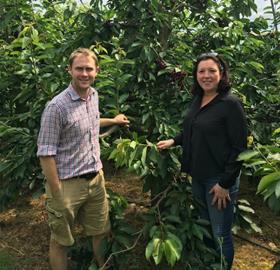
There’s a saying that nothing worth having comes easily, and that’s certainly the case with cherries. One of the standout performers in the fresh produce category over the last five years, you could be forgiven for thinking that growers would be rushing to plant cherry trees and take advantage of one of the booming categories in the fresh produce aisle, but that assumption belies the patience, skill and determination that is required to succeed.
The little red stonefruit, whose attractive appearance is boosted by myriad health properties, is notoriously challenging to grow, susceptible to weather and temperature swings and requires a long-term vision to really maximise its potential.
One grower who has committed to invest is Kent-based AR Neaves & Sons, a family-run business that was founded in 1941 by current manager Sarah Neaves’ grandfather. Cherry production was a hugely risky enterprise that became more commercially viable for AR Neaves in 2006 when the company switched to smaller Gisela trees, which can be grown under cover, produce a heavier crop and can better cope with the stresses of the British weather. “Before that rain used to be a huge problem and we used to say that only one in seven years would be a good crop,” explains farm manager Will Dixon. “It’s still a costly business because cherry trees are more expensive than others, and then you’ve got the tunnelling systems, irrigation and so on.”
Despite the challenges, production has gone from strength to strength, and the business underlined its commitment three years ago with a £1.5 million spend on a new packhouse and equipment including an optical grader and sorter to check for size, colour and internal defects. Cash has also been spent on two punneting machines, heat sealers and checkweighers.
That infrastructure is vital for a product that takes at least five years to see any payback, and with cherry trees lasting around 15 years there is only a small window to secure profitability, which Neaves concedes makes it something of a labour of love.
The company has the capacity to produce 370-400 tonnes, but this summer’s crop could be down by as much as 50 per cent thanks to the volatile recent weather, which has swung from severe cold at the end of March to heavy rain and then this month’s heatwave. This year’s heavier than usual ‘June drop’, which has also hit apple growers’ volumes, has not done cherries any favours either.
At least the quality of what’s left is described as outstanding, with firm, dark fruit and good flavour. That should ensure that consumers have a great experience and are left wanting more, offering hope that those double-digit sales increases of the last few years will continue.
The company is hoping to extend the early season – which tends to suffer with softer fruit more prone to splitting than mid-to-late season alternatives – with the new Sequoia variety, and has also been trialling a range of others. Supplying the full range of supermarkets, Neaves says the retailers have been highly supportive and keen to promote what has become a fashionable fruit.
Neaves markets through Berry Gardens, giving it the benefit of a major fruit producer organisation behind it, and Berry Gardens has been pushing cherries on social media and through tastings at events such as Pub in the Park. The crop has also been boosted by coming under the umbrella of the same people who have run the successful British Summer Fruits campaign.
That suggests that, despite the rollercoaster ride that can be cherry production, there is plenty to be optimistic about for a fruit that combines health, taste and practicality – a modern fruit that ticks all the boxes for today’s demanding shopper.



